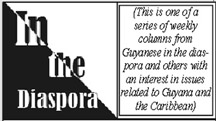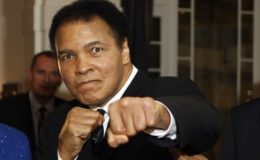By Nesha Zahoratul Haniff
Nesha Zahoratul Haniff is professor in the Departments of Afroamerican and African Studies, and Women’s Studies, University of Michigan. She is the director of the Pedagogy of Action, a project that engages students in grass roots activism focusing on who is empowered in so-called empowering projects, the privileged or the poor? The ethos of this work started in Guyana with Red Thread in the late 1980’s.
 I know that there are millions of women in the world whose very perception of themselves shifted because of the great Muhammad Ali. This is the story of my shift as a girl growing up in the Caribbean. I add this female voice in mourning and honoring this man. My evolution as a feminist, politically conscious woman, started with Muhammad Ali in 1965.
I know that there are millions of women in the world whose very perception of themselves shifted because of the great Muhammad Ali. This is the story of my shift as a girl growing up in the Caribbean. I add this female voice in mourning and honoring this man. My evolution as a feminist, politically conscious woman, started with Muhammad Ali in 1965.
When I was a little girl, I wanted to be the American actress Marilyn Monroe, she was white and she was beautiful. I was born in Guyana, a country predominantly of East Indian and African descent, we were Muslims, Christians and Hindus. In 1965 my father made us sit around the radio to hear Muhammad Ali’s fight with Liston. He had changed his name and claimed Islam and that was enough for my father. I remember that Ali began to praise Allah after he won the fight and in that moment, just saying the word Allah he moved all Muslims listening to that fight to the center of the world. He gave Islam an uplift in my world, where to be Christian was to be modern, to be named Loretta or Ivy was a sign that you were civilized. We all had Muslim names, I was embarrassed by my middle name Zahoratul and I wished I had a cool name that people could pronounce like Margaret or Anne. Such was my colonization in 1965.

When people say that Muhammad Ali was the most famous man in the world that was literally true. This story is not about America, it is about his impact in a small part of world where I lived. We loved him because when he asserted himself saying my name is Muhammad Ali and I reject my slave name, he was speaking to the millions in the colonized world, who went to Christian schools, who were converting to Christianity and happily abandoning their own culture. In my yard we had many hibiscus flowers, I loved that flower, it was so beautiful to me. But when I went to school I recited poems about daffodils, and although I had never seen daffodils I was sure they were beautiful because they were in my text book. It never occurred to me to ask why I never read about hibiscus flowers. Even though my education did not teach me to love myself, Muhammad Ali in 1965 made me begin to love my name. At school we would be asked what is your christian name (meaning your first name), and I began to think my first name is a Muslim name not a Christian name and a small consciousness emerged.
I know that the Nation of Islam was a very sexist organization and that they did not support integration. They believed in separation. I understand the basis for all of this and Muhammad Ali himself evolved from these ideas, but I did not hear or see this when he said that black men should choose black women because they were more beautiful and you must love your own. To me he was championing the beauty of women of color, praising the beauty and shape of brown women’s bodies. This to a girl who wanted to be Marilyn Monroe was earth shattering and still revolutionary in today’s world where the best-selling cosmetic is a skin lightening cream. I do not think that Muhammad Ali’s impact on the aesthetic of blackness can be appreciated unless you were indeed colonized to think that white was superior. He loved Black women and Black women loved him. You can argue with me about the context of all of this, I really don’t care, I heard only that which made my heart beat faster, that I did not have to be Marilyn Monroe to be the most beautiful girl in the world. I realized that Marilyn Monroe was blonde, but I wanted to be her with dark hair, somehow I didn’t see that, and I began to shed the dream of white skin.
He was himself perfectly beautiful and insisted that we see it. He loved the word pretty to describe himself, not handsome, not good looking, but pretty …”ain’t I pretty”. He must be the first boxer to describe himself as pretty. The paradigm for boxing is silence, lumbering, exhibiting brute force, and muscled. You don’t speak, you punch, you don’t dance, you stalk. You don’t keep your hands down, you keep them up, you don’t expose your face, you cannot move your head with such lightning speed to avoid injury. This shift to a new paradigm of boxing was immediately rejected as lacking in the fundamentals of boxing. It was wrong. It was not wrong it was right. He had feminized boxing, by bringing emotion, lightness, beauty, suppleness and the word pretty. They called him the Louisville lip, braggadocio, a buffoon because they mistook his intentionality as play. They did not understand that he was Anancy.
When he was silenced by Parkinson’s disease I was sad because his words had rained fire on Babylon and this would now come to an end. It was hard to see the deterioration of his body but nothing could sway his indomitable spirit. He was still playful, loved children, raised millions of dollars for Parkinson’s disease, signed his Muslim pamphlets, answered all his mail and lit the Olympic torch. In a strange way his silence was a gift to his legacy of fire and brimstone because in this world of political correctness and social media he would have been silenced. He had already said everything. His silence and his legacy could not have been in better hands than those of the magnificent Lonnie Ali. I thank her for grace.
His silence over the last 30 years did not mean that he was forgotten. In my work at the University of Michigan I have been teaching a class on race and genius in America, where the life of Muhammad Ali is interrogated and studied, because the very act of knowing his life is to be inspired. Generations of Americans should know him, because they benefit from his legacy. When my students heard of his death, many of them immediately thought of me and reached out to me. The fact that they thought of me when he died, that his name and mine were in the same thought is the highest compliment of my life. He was a revolutionary leader in my generation who moved me to act, to teach, to be an example. He inspired me to fight for my own liberation as he had fought for his.
Allah will grant you Aljannah dear Muhammad Ali. Assalaam alaikum.
